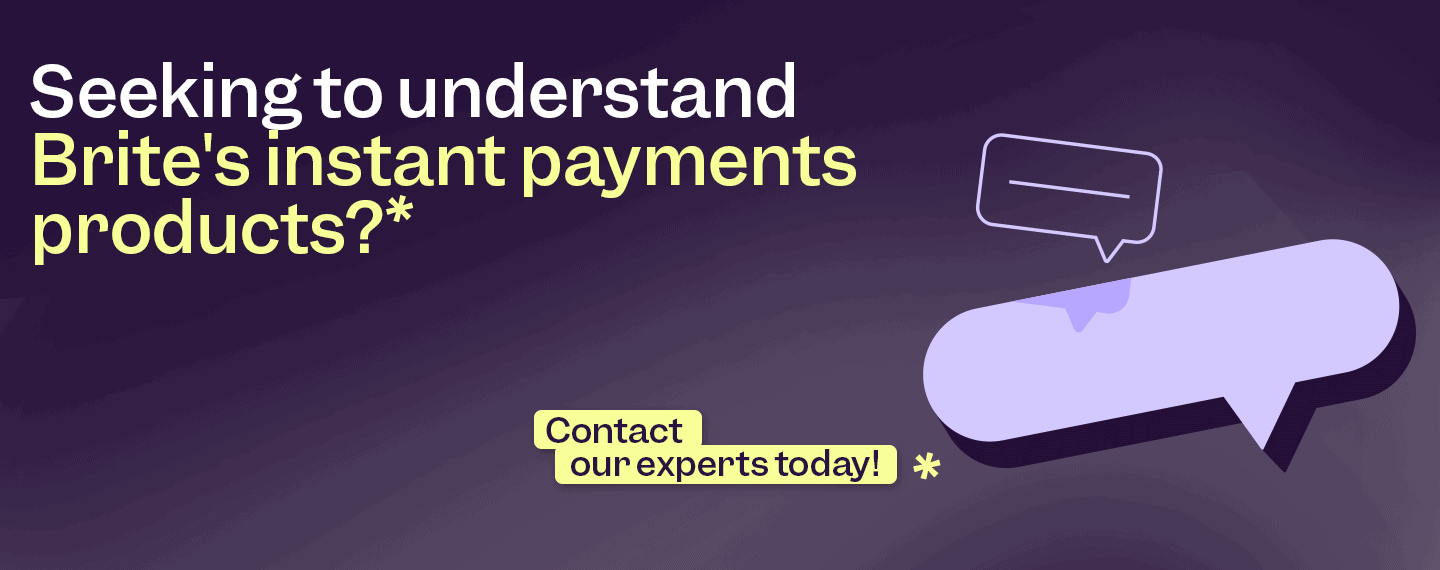In this article, we’re covering everything you need to know about chargebacks: including the difference between a chargeback and a refund, as well as how to prevent fraudulent chargebacks as a merchant using instant payments.
Chargeback fraud is a growing problem for e-commerce retailers and is now the key fraud prevention priority for 46% of merchants. We’ve already looked at other types of payment fraud before at Brite, so read on to learn new ways to protect your bottom line.
What are chargebacks, and what’s the difference between a chargeback vs refund?
A ‘chargeback’ is a process where a customer disputes a transaction on their credit card and requests a refund from their bank or credit card company.
This process allows customers to protect themselves against unauthorised transactions, fraudulent activity, or merchant misconduct. It also allows them to resolve disputes without directly contacting the merchant.
Since they also involve returning money to the consumer, chargebacks are similar to refunds. The main difference between a chargeback vs refund is that customers typically get to keep the product after issuing the request.
Is ‘friendly fraud’ the same as chargebacks?
No. Although they are related, friendly fraud isn’t the same as a chargeback.
Friendly fraud is a kind of chargeback fraud that occurs when a customer mistakenly initiates a chargeback (usually due to confusion or forgetfulness). Because of this, friendly fraud isn’t deliberately malicious. For example, a customer might not recognise a merchant’s name on their credit card statement. Or, they may forget they ever made a purchase.
Meanwhile, chargeback fraud is a broader term referring to any fraudulent activity involving a customer initiating a chargeback on a legitimate purchase. Specifically, a customer deliberately requests a chargeback on a purchase they’ve already authorised and received. For instance, customers usually claim a product or service was defective, not as advertised or was undelivered. Because of this key difference in intent, chargeback fraud can be considered a form of theft.
Both friendly and chargeback fraud are harmful to retailers, as they can result in increased chargeback rates as well as lost revenue. They can also trigger penalties in the form of added chargeback fees for merchants.
Avoiding chargebacks
Retailers will want to avoid chargebacks the majority of the time, and there are some tactics out there to help businesses circumvent them.
For instance, a retailer could prevent, or even dispute, a chargeback by providing accurate product descriptions, easy refund policies, excellent customer service and using fraud prevention tools.
Chargebacks vs. Refunds – how they compare
Typical chargeback frequency
As we discussed in our article on how to do e-commerce refunds right, most shoppers return 5-15% of their purchases. By contrast, rates of chargebacks are much lower – clocking in at around 0.6% on average. Of which, research suggests, 86% are fraudulent.
Despite declines in fraud across the EU, chargeback fraud has been on the rise. In 2022, 33% of Spanish merchants reported increases in chargeback fraud. Meanwhile, Germany, the UK, Ireland, Italy and France have also all reported a 46% increase in rates of chargeback fraud.
Similar surveys suggest it’s now the second-most common type of fraud globally. What’s more, mid-sized merchants suffer disproportionately, accounting for 3.7% of all chargeback orders. This is compared to enterprise and small businesses at 3.3% and 2.6%, respectively.
The hidden costs of fraudulent chargeback fees for merchants
As with refunds, research on the average chargeback amount is mixed. Regardless, along with the original transaction sum and cost of goods, merchants may need to pay fees on each chargeback transaction. So, merchants with low Average Order Values (AOVs) or profit margins could face steep costs. You’ll also have to pay your usual transaction fee to cover the cost of the credit transfer itself.
Combined, this means chargeback fees for merchants can amount to two to four times the original transaction sum! In a worst-case scenario, you could even lose access to payment processing services entirely (and the ability to collect revenue) if your chargeback rate goes above 1%. This is because it suggests your business is acting unscrupulously and payment solutions providers are trying to avoid risk.
What merchants need to know about friendly fraud:
Chargeback rules across the EU
A 2020 report from the European Consumer Centre outlines the complex legal landscape of chargebacks in the EU. In general terms, EU law only permits chargebacks for credit card transactions, not for purchases made using debit cards.
However, although debit card transactions aren’t covered by EU regulations, chargebacks can apply to them in certain countries, such as Portugal and Denmark. As always, national policies apply. Other EU member states have additional provisions for debit card purchases but often restrict them to non-delivery of goods. Similarly, Finnish and Irish law say sellers and third-party financial institutions are jointly liable during chargebacks – an important distinction beyond ‘credit card companies.’
Since consumers are increasingly adopting alternative payment methods like Buy Now, Pay Later schemes, merchants need to be wary of chargebacks from new payment channels. On the other hand, Spanish customers must pay for additional expenses for chargebacks issued outside the ‘cooling off period.’ This is defined as at least 14 days under EU law.
Consumer rights and merchant protections
Chargebacks are supposed to be a last-ditch effort, as consumers should follow the normal refund process first. Regardless, consumers have up to 120 days to submit a chargeback request (depending on their card issuer) and list a reason why. Then, merchants must respond within 30 days. Unfortunately, this starts when the customer files the request, so you could lose a day or two before being notified.
Merchants, make sure to check your bank statements for ‘Reason codes’ from card issuers. For example, VISA uses code 13.1 for ‘non-delivery of the good or service.’ If you’re able to prove delivery via your third-party logistics (3PL) provider or the customer’s failure to engage with you first, it could help you dispute the chargeback request. However, there’s another way merchants can protect themselves.
How to prevent chargebacks as a merchant using instant payments
Chargeback protections aren’t as generous for authorised payments; like when consumers use their PIN number. This is because card issuers and banks can evidence customers’ intent to buy. That’s why Brite’s Instant Payments offers online merchants a perfect solution to chargeback and friendly fraud.
As a payment method backed by Strong Consumer Authentication and open banking, we integrate directly with the customer’s bank account. As a result, consumers have to validate each transaction using their bank’s own authentication process.
This limits customers’ ability to dispute charges, as they’ve granted specific permission for the credit transfer. So, as long as you’re able to evidence the quality and delivery of your goods, you can say goodbye to friendly fraud. Best of all – as the name suggests – the payments arrive in seconds, meaning you can improve your cash flow at the same time. What’s not to love?
Eliminate chargeback fraud with Instant Payments from Brite
With chargeback fraud on the rise, merchants need reliable methods to protect their bottom line. Unfortunately, retailers can’t always successfully dispute chargeback requests once they’ve been issued. That’s why preventing chargeback and friendly fraud in the first place is so important.
Brite is a leading provider of Instant Payments across Europe. Powered by open banking, our technology eliminates chargeback instances by ensuring customers authenticate every purchase. What’s more, with bank-level security embedded throughout, we ensure every transaction is kept safe from other types of fraud, too.
Learn more about our account-to-account payment solutions and how we can help improve your cash flow at the same time by getting in touch today.





